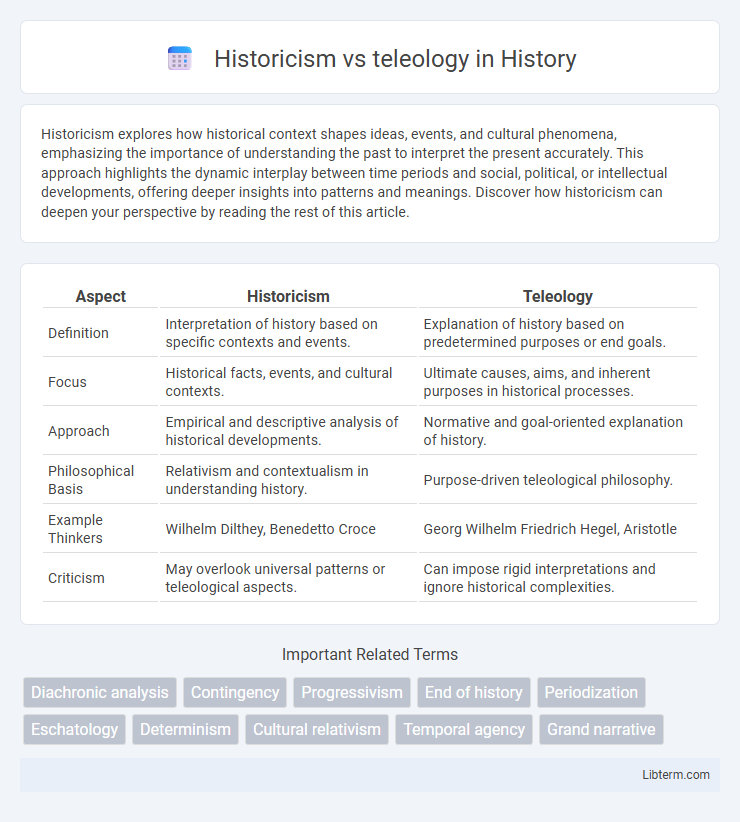Historicism explores how historical context shapes ideas, events, and cultural phenomena, emphasizing the importance of understanding the past to interpret the present accurately. This approach highlights the dynamic interplay between time periods and social, political, or intellectual developments, offering deeper insights into patterns and meanings. Discover how historicism can deepen your perspective by reading the rest of this article.
Table of Comparison
| Aspect | Historicism | Teleology |
|---|---|---|
| Definition | Interpretation of history based on specific contexts and events. | Explanation of history based on predetermined purposes or end goals. |
| Focus | Historical facts, events, and cultural contexts. | Ultimate causes, aims, and inherent purposes in historical processes. |
| Approach | Empirical and descriptive analysis of historical developments. | Normative and goal-oriented explanation of history. |
| Philosophical Basis | Relativism and contextualism in understanding history. | Purpose-driven teleological philosophy. |
| Example Thinkers | Wilhelm Dilthey, Benedetto Croce | Georg Wilhelm Friedrich Hegel, Aristotle |
| Criticism | May overlook universal patterns or teleological aspects. | Can impose rigid interpretations and ignore historical complexities. |
Introduction to Historicism and Teleology
Historicism emphasizes the importance of historical context and the unique development of events, asserting that understanding arises from examining specific cultural, social, and temporal factors. Teleology, in contrast, interprets history through the lens of purpose or end goals, suggesting that events unfold according to an inherent direction or final cause. These contrasting approaches shape interpretations in philosophy, historiography, and social sciences by prioritizing either context-driven narratives or goal-oriented progressions.
Defining Historicism: Key Concepts
Historicism emphasizes understanding social and cultural phenomena within their specific historical contexts, rejecting universal laws or predetermined ends. It highlights the significance of temporal, cultural, and situational factors in shaping events and ideas, thereby opposing the teleological view that history follows a fixed, goal-oriented progression. Key concepts in historicism include contingency, relativism, and the critique of abstract, ahistorical reasoning.
Understanding Teleology: Core Principles
Teleology centers on the notion that processes and events are directed toward specific ends or purposes, emphasizing goal-oriented explanations in history and nature. Core principles include intentionality, final causes, and the idea that outcomes can be anticipated based on inherent purposes. This contrasts with historicism, which stresses understanding events within their unique temporal and cultural contexts without presupposing predetermined ends.
Historical Origins of Both Approaches
Historicism, emerging prominently in the 19th century with thinkers like Wilhelm Dilthey and Leopold von Ranke, emphasizes understanding historical events within their unique contexts without projecting future outcomes. Teleology, rooted in Aristotelian philosophy and revitalized during the Enlightenment, interprets history as directed toward specific ends or purposes, often linked to progress or divine plans. The divergence of these approaches lies in historicism's focus on empirical context versus teleology's interpretive projection of ultimate goals.
Major Proponents and Critics
Historicism, championed by philosophers like Wilhelm Dilthey and Benedetto Croce, emphasizes understanding history through context and unique events, while teleology, supported by figures such as Hegel and Aristotle, interprets history as goal-driven or purpose-oriented. Critics of historicism, including Karl Popper, argue it lacks predictive power and risks relativism, whereas teleology faces opposition from philosophers like Friedrich Nietzsche, who challenge its deterministic and often Eurocentric narratives. The debate highlights contrasting methodologies in historiography and philosophy regarding the structure and meaning of historical processes.
Methodological Differences in Analysis
Historicism approaches analysis by emphasizing the importance of historical context, viewing social phenomena as products of specific temporal and cultural conditions. Teleology, in contrast, interprets events and processes based on predetermined purposes or end goals, often projecting future outcomes backward. Methodologically, historicism relies on diachronic investigation and contextualization, while teleology employs a goal-oriented framework that shapes interpretation according to desired ends.
Impact on Historiography and Philosophy
Historicism emphasizes understanding historical events within their specific contexts, shaping historiography by promoting detailed, contextual analysis over universal narratives. Teleology influences philosophical interpretations by framing history as progressing toward a predetermined goal, often leading to linear, purpose-driven historical explanations. The debate between historicism and teleology impacts historiographical approaches by contrasting contextual complexity with goal-oriented narratives, affecting how historians interpret causality and historical meaning.
Case Studies Illustrating Each Perspective
Case studies in Historicism often emphasize the unique historical context, such as Fernand Braudel's analysis of the Mediterranean, which highlights long-term social, economic, and environmental structures shaping history. Teleology-focused case studies, like Hegel's philosophy of history, interpret events as progressing toward a predetermined goal or end state, exemplified by interpretations of the French Revolution as a necessary step toward modern freedom. These contrasting perspectives illustrate how Historicism prioritizes temporal specificity and complexity, while Teleology centers on purpose-driven historical development.
Contemporary Debates and Relevance
Contemporary debates on historicism versus teleology emphasize the tension between viewing history as a series of contingent events shaped by cultural and social contexts, versus interpreting history as a purposeful process directed toward specific ends or goals. Critics of historicism argue that it may neglect overarching narratives and long-term purpose, while opponents of teleology caution against imposing predetermined outcomes on complex historical phenomena. This discourse remains relevant in fields such as philosophy, historiography, and political theory, influencing how scholars analyze historical causality, meaning, and future projections.
Conclusion: Comparing Future Implications
Historicism emphasizes understanding historical events within their specific temporal contexts, predicting future outcomes based on past patterns and conditions, while teleology interprets history as driven by purposeful, goal-oriented progress leading to predetermined ends. The future implications of historicism encourage adaptive strategies grounded in evolving socio-cultural dynamics, whereas teleology supports a more deterministic outlook, expecting historical development to conform to an inherent final purpose. Comparing these views, historicism fosters flexible, context-sensitive forecasting, and teleology promotes a fixed, goal-driven vision of historical progression.
Historicism Infographic

 libterm.com
libterm.com